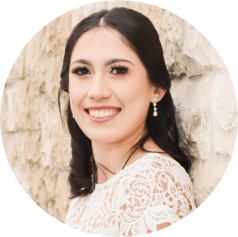
ADA CECILIA BERSOZA HERNÁNDEZ
Tecnológico de Monterrey
México
Ada Bersosaza graduated from Brown University in 2015 with a Bachelor of Science in Biology and a track in Ecology and Evolutionary Biology. She graduated with honors and an award for Excellence in the Biological Sciences due to her thesis "Exploring the role of climate in limiting woody plant species' distributions along elevational and latitudinal gradients".
In May 2018, Ada graduated with a Master of Science in Environmental Engineering Sciences from the University of Florida. During this period, she studied the history of Eastern oyster restoration in the U.S. and applied different restoration techniques in the Florida Atlantic coast as part of her research. She joined the Science Department at Campus Santa Catarina in August 2018 and became a full-time teacher in February 2020.
Since then, she has taught and coordinated the courses of Matter and the Environment, Matter and Sustainability, Science and Technology in the XXI Century, and a Biochemistry elective. In addition to her teaching role, Ada has participated in volunteering projects, as a mentor for extracurricular activities, and as an advisor for IB students wishing to complete their extended essay in Biology or Chemistry.

BÁRBARA GONZÁLEZ Q
Tecnológico de Monterrey
México
Bárbara González has a Bachelor’s Degreee from Tecnológico de Monterrey. She has broad experience in Finance and Administration, and Environmental consulting. By vocation, she is a high school physics and chemistry professor.
Bárbara is passionate about social work and the environment, and she is a dog and outside sports enthusiast.

ELCIAS AMAYA
Tecnológico de Monterrey
México
Elcias Amaya has a Bachelor's Degree in Chemical Engineering from Monterrey Institute of Technology and a Master's Degree in International Marketing from Hult International Business School.
Prior to becoming a teacher and work for Monterrey Institute of Technology in the Continuous Education Department, Elcias Amaya worked for Pepsico México Foods, Mars Wrigley Confectionary and Dawn Foods México as Project Coordinator and Procurement Coordinator.

CLAUDIA ORDAZ
Tecnológico de Monterrey
México
Claudia Ordaz was a professor of Business and Entrepreneurship at the Monterrey Institute of Higher Technology and Education (ITESM) in Mexico. She is a specialist in food industry engineering and holds an academic degree also from the ITESM. She obtained Master’s degrees in technology education from both the University of British Colombia of Canada and the ITESM. She has written extensively for various Mexico-based newspapers and magazines, including the nationally renowned El Norte and the Meat industry journal CARNETEC.
Currently, lectures Chemistry courses at PREPA TEC and is the Committee Coordinator at the food processing plant of HAMBRE CERO NUEVO LEON.

ARTURO MÉNDEZ
Tecnológico de Monterrey
México
Arturo Méndez is a professor at Tecnológico de Monterrey, PrepaTec Santa Catarina. He is an Engineer, Educator, Enthusiast and Compulsive Maker and Inventor, Entrepreneurship and Innovation Coach, Tech Buff, Youth Football Coach. Arturo is a Pioneer in STEM Education and Educational Robotics in Mexico. Curriculum Designer at Tecnológico de Monterrey.
He is also a speaker, instructor, and collaborator with several STEAM, Innovation, and Education initiatives worldwide. Arturo is enthusiastic about using emerging technologies to solve problems. Passionate on helping others innovate and create.
Abstract
The project of Sustainability Ambassadors was designed as part of the key activity for the course Matter and Sustainability. For three weeks, students worked in teams to change their lifestyles, adopt habits, and take actions that would result in positive environmental change. The project consisted of three parts (planning, documenting, and communicating) and was designed to have an impact in three different spheres of students’ lives (personal, family, and community).
During the first phase of the project, students had to propose an action plan that encompassed changes in their lifestyle, in their household, and among their friends and neighbors. The second phase required students to carry out their actions and document the process. Teams created an Instagram account where they would post relevant information about their chosen cause and would share the steps they were taking to lead a more sustainable lifestyle. After three weeks, students created an infographic where they explained their projects and the impact they had in their personal lives, their family, and their community. Students also reflected on how they could continue working towards a more sustainable lifestyle and how they could motivate others to follow in their footsteps.
Students were given the freedom to focus their project on a cause that motivated them. Among the most popular sustainability topics were the zero-waste movement, fast fashion, recycling, and protection of water resources. Projects encompassed small personal actions, such as switching to zero-waste products and reducing packaging waste, to larger and more ambitious family and community projects, such as creating a family garden to grow their own herbs or vegetables and starting a family or community compost. During these three weeks, our students’ experiences were complemented with the “Sustainability Weeks” initiative, a combination of movies, workshops, and conferences carried out during class time. Students explored the topic of persistent organic pollutants, learned about food waste and the Sustainable Development Goal of Zero Hunger, heard from an expert and entrepreneur in the zero-waste movement, among other activities meant to inform, detonate thoughtful reflection, and inspire positive environmental action.
The Sustainability Ambassadors project helped students develop the competency of personal and social responsibility given that they had to reflect on their current habits and lifestyle to make a conscious choice about the changes they would commit to for the following weeks. Students also developed their scientific competency since their projects had to be supported by evidence from scientific literature. Students had to research their chosen environmental problem and justify with current and relevant data why it was a cause worth addressing.
This project was implemented at PrepaTec Santa Catarina during the Spring 2021 semester in 14 Matter and Sustainability groups, resulting in the participation of approximately 400 students. The teachers involved and the details of their participation are outlined below.